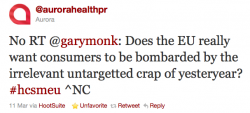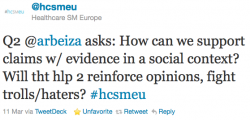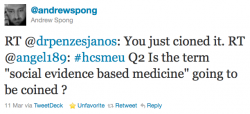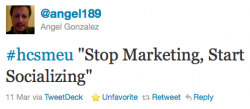Traditional marketing ain’t dead yet.
Old skool, that’s how we roll
I was in a meeting last month and one marketing manager’s idea of promoting a sponsor was to slap their logo all over the place. I was partially against it because he wanted to slap that logo all over my social marketing channels. But it also struck me as bizarre and I couldn’t put a finger on it as to why it did.
I wrote down at the time that in “old marketing” you slapped your logo around, made sure that you took every opportunity to get your jingle, brand elements, company name, tagline, in front of anyone who would listen or look.
Isn’t this the type of marketing we are trying to change by being more social through blogs, social networks, and the like – socializing around media and stories that emotionally connect people to a product or brand? Isn’t “new marketing” about stories, causes, experience, and action?
Prove it to me, friend
A few weeks back I was browsing the Health Care Social Media EU stream on Twitter (#hcsmeu) and found some great nuggets that were relevant to this brain wave:
@garymonk asks if the EU wants folks to be bombarded by irrelevant un-targeted krap.
In a later message in that discussion, @arbeiza is on to something when asking how we can support evidence in a social context. And @angel189 then coins a great term “social evidence based medicine” that I think has the kernel of what I am trying to get at.
As @angel189 goes on to say: “Stop Marketing. Start Socializing.”
I think the cognitive dissonance I am feeling with all the logo-slapping is that marketing is not just about being social, but about tapping into the “social evidence” that a customer should care about a product or brand.
Social Evidence
We as marketers need to find, promote, reveal, and share stories that contain evidence that can be socialized (with the best evidence coming from our customers’ social network, not us). The only way to get past the noise of all that logo-slapping is to connect with customers with evidence they can understand within a trusted social framework, a social framework that they are part of and create the stories of, a social framework that contains the sources that influence these customers in their choice of brands, causes, belief systems.
What do you think?
Closing
And I could say that this isn’t a big revelation. But while I was at the Mecca of Social Media (aka SXSW) I was appalled (disgusted, shocked, disappointed?) with the complete dominance of old style, slap-the-logos-on-the-boobs-and-any-other-surface-you-can-think-of old marketing that the very hipsters of SXSW are trying to tear down.
As one old pal said, you can spend 40MEur on some big gimmicky marketing campaign or post a great story on a blog (albeit, his influential blog) – you still get one post on Engadget.
Every day, as I reach out to our audience of patients and families, each post is carefully crafted to be relevant, cognizant of the stories readers socially share as evidence of the amazing things our hospital does. This is not how they fit in my brand story, but how I fit in their stories, their evidence of how we are part of their lives.
And when I get that right, I am theirs.




